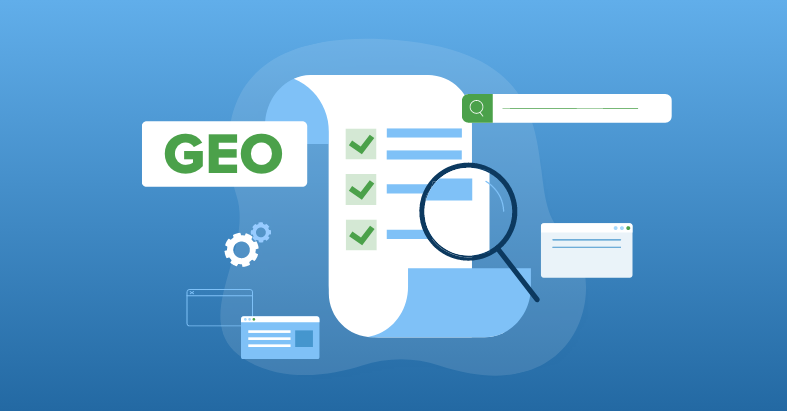The search landscape is undergoing a seismic shift. For years, Search Engine Optimization (SEO) was largely dictated by keywords, backlinks, and technical tweaks designed to please algorithms. But the game has new rules, with AI fundamentally changing how consumers find information and how businesses are discovered.
Users are now getting direct, synthesized answers, often without ever clicking through to a website. This presents a critical re-evaluation of what's truly at stake for your online visibility.
No longer is it solely about climbing to the top of traditional Search Engine Results Pages (SERPs). Instead, businesses must now aim for AI citation visibility, making sure their brand and content are the authoritative sources AI models reference in their generative responses.
Switching up your strategy for Generative Engine Optimization (GEO) has a double impact: it will not only safeguard your existing organic presence but also unlock a competitive advantage, positioning you as a leader in the AI-first search era.
The AI Citation Ecosystem
Learning how to do Generative Engine Optimization starts with understanding the new ecosystem of AI search. And this isn't just a Google phenomenon, either; a variety of AI systems are sourcing and synthesizing information in unique ways.
Gone are the days when a simple algorithm spat out ten blue links. Today's AI systems are sophisticated, constantly evolving, and pulling from vast datasets.
Google AI Overview
Google's AI Overviews are essentially the next generation of featured snippets. They aim to provide direct answers, often aggregating information from multiple sources. For your content to be featured here, it's not just about being "number one" anymore.
Google heavily relies on its E-E-A-T (Experience, Expertise, Authoritativeness, and Trustworthiness) framework. This means AI Overviews prioritize content that demonstrates real-world experience, the kind written by recognized experts and coming from authoritative domains.
ChatGPT
ChatGPT, at its core, operates on a massive dataset it was trained on up to a certain cutoff point. However, both free and paid versions now have real-time Browse capabilities, allowing them to access the live internet for more current information.
Content freshness and relevance will influence GPT's output, even if its base knowledge isn't continuously being updated.
Perplexity AI
Perplexity AI positions itself as an "answer engine" that excels at providing answers with transparent, inline citations. It leverages real-time web searches for nearly every query, emphasizing factual accuracy and source credibility.
But Perplexity doesn't just pull information; it also aims to provide verifiable answers by directly linking to its sources. This makes source authority and the quality of your outbound links (where you cite your information) extremely important.
What AI Looks For (vs. Traditional SEO)
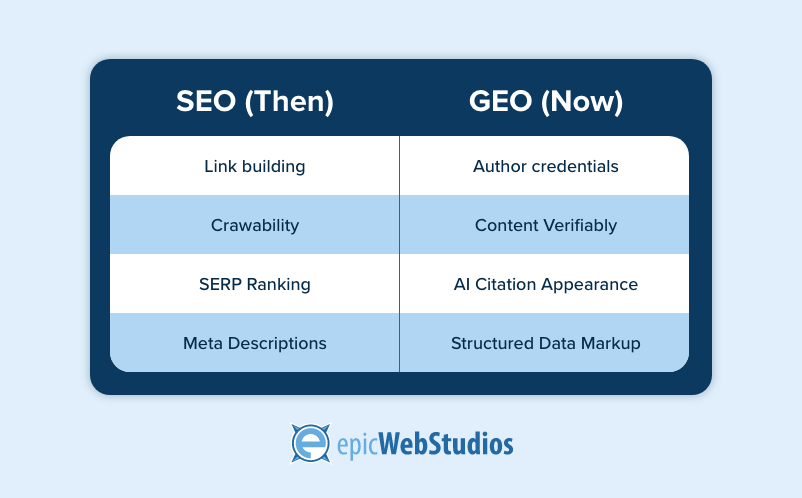
While traditional SEO focuses heavily on keywords and technical crawling, AI models have a more nuanced understanding of content quality and relevance.
Authority Signals
Beyond traditional backlinks, AI places a lot of value on demonstrable authority. This includes explicit credentials, mentions from reputable outlets or industry publications, and participation in relevant discussion forums.
AI systems actively seek out recognized experts, making brand reputation and subject matter expertise one of their main ranking factors.
Content Structure
AI models thrive on well-structured and easy-to-digest information, favoring:
- Clear, descriptive headings (H1, H2, H3) that align with common questions.
- Concise, direct answers to questions, often at the beginning of sections.
- Bullet points, numbered lists, and tables for key takeaways and comparative information.
- Consistent terminology and concepts.
- Structured data markup (see Schema.org), like FAQ or Article schema, to directly tell AI what your content is about.
Factual Accuracy
In the age of AI "hallucinations" (where systems can confidently present false information), factual accuracy is everything. AI models are designed not just to understand language but to identify and prioritize content that is verifiable, well-researched, and free from misinformation.
This means your content isn't just competing on relevance or keywords; it's being evaluated for its truthfulness, as well. To boost your chances of earning a citation, your content should include credible sources, data, or analysis, all of which are signals to AI that your information is reliable.
How to Do Generative Engine Optimization: Immediate Action Items
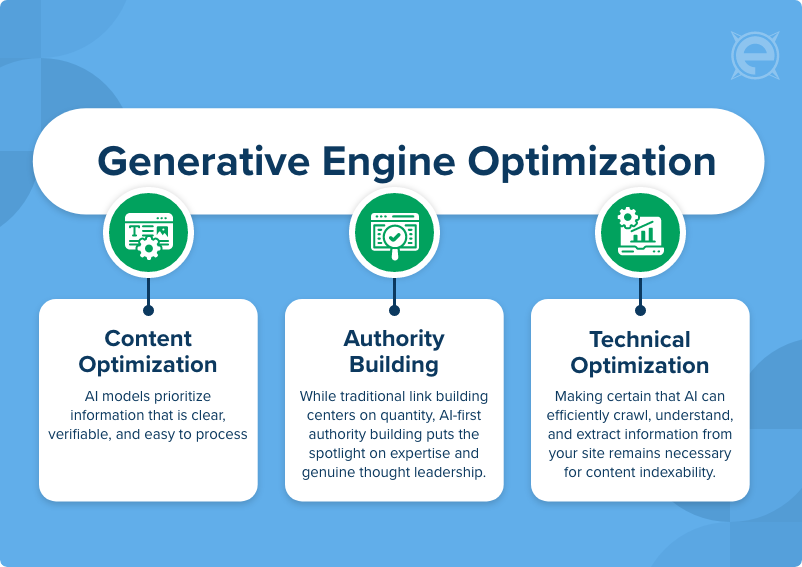
If you're pinning down how to do Generative Engine Optimization effectively, you need an actionable plan that shifts your focus from traditional keyword density to building genuine authority and clarity.
Content Optimization
The basis of AI optimization lies in the inherent quality and structure of your content. AI models prioritize information that is clear, verifiable, and easy to process, often consuming content in "chunks" rather than entire pages.
- Fact-Checking and Accuracy: Implement rigorous internal fact-checking processes. Every piece of information (especially statistics, claims, and definitions) must be verifiable.
- Clear Answers to Common Questions: Identify common audience questions and provide concise, definitive answers early in your content.
- Source Citations within Your Content: Link to original research, authoritative studies, or credible publications.
Authority Building 2.0
While traditional link building centers on quantity, AI-first authority building puts the spotlight on expertise and genuine thought leadership.
- E-E-A-T Optimization for AI Systems: Showcase your team's credentials, build robust "About Us" pages, and create detailed author bios that highlight relevant qualifications.
- Bylines and Author Credentials: Every piece of expert content should have a clear author with a linked bio showcasing their credentials. For articles compiled by a team, make sure E-E-A-T is established through structured data for the brand.
- Industry Partnerships: Seek opportunities to be cited, quoted, or publish guest posts on highly authoritative industry publications.
- Research and Original Data: Invest in primary research, conduct original surveys, analyze data, and publish your findings.
Technical Optimization
Though content quality is king, technical foundations still matter! Making certain that AI can efficiently crawl, understand, and extract information from your site remains necessary for content indexability.
- FAQ Schema and Q&A Formatting: Implement FAQ schema on pages with question-and-answer sections. Beyond the schema, format these sections clearly with bolded questions and direct, succinct answers.
- Table and List Markup: Wherever possible, present comparative information, steps, or key takeaways in tables or bulleted/numbered lists.
- Descriptive Alt Text: Make sure all images have descriptive alt text that includes relevant topic context. Use
andelements with correct markup to help with parsing.
- Site Speed and Core Web Vitals: Allow AI bots like GPTBot and Google-Extended to crawl your site via robots.txt files.
Content Strategy Pivots: Adapting for the AI-First Era
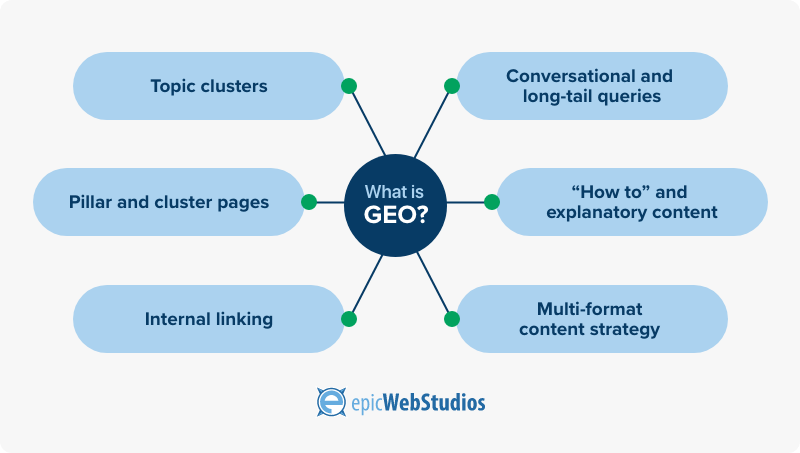
With your technical foundation and authority signals in place, your next move is to update your content strategy.
A core principle of how to do Generative Engine Optimization is to revamp the way you plan, create, and connect your content to serve both generative AI models and the users who rely on them.
Topic Clusters
Google's AI Mode utilizes a "query fan-out" technique, where complex queries are broken into multiple subqueries. It rewards sites that demonstrate comprehensive topic breadth and depth.
If your site is seen as an authority across an entire topic, various subqueries might pull from different pages within your domain, significantly increasing your visibility.
Pillar and Cluster Pages
Develop robust pillar (or hub) pages for your business's core, broader topics. These pages should briefly summarize each facet of the topic, cover key sections, and then link out to more detailed cluster pages (in-depth support for specific subtopics).
Note that each cluster page should have a unique purpose and address a specific query intent.
Internal Linking
Cross-link between relevant cluster pages and always link back to your central pillar page. This way, you establish relationships across your content, helping AI understand the full context and span connections between topics.
Conversational and Long-Tail Queries
Move beyond simple keyword matching and think about how a person would ask a question naturally to an AI assistant. Optimize your content for these conversational queries, incorporating full questions and answers directly into your headings and body copy.
AI further excels at answering niche, highly specific questions. To take full advantage, try to create content that directly addresses these long-tail queries using precise language.
"How-to" and Explanatory Content
AI systems are frequently used to understand processes and concepts. Develop rich "how-to" guides, step-by-step tutorials, or in-depth explanatory content that breaks down complex subjects into easily digestible parts.
This type of content is inherently designed to answer direct user needs and provides excellent source material for AI synthesis at the same time.
Multi-Format Content Strategy
AI search systems are retrieving and synthesizing multimodal content, including images, charts, tables, and videos. To provide the most scannable answers, your content strategy must embrace diverse formats.
On that note, always provide full, accurate transcripts for video content. Doing so makes your video content crawlable and indexable for AI systems, allowing them to extract key information.
Aim to create concise video summaries that can serve as direct answers for AI overviews, linking back to the full video for deeper engagement.
Measurement and Monitoring in the AI Era
Traditional SEO metrics, while still relevant for organic traffic, don't fully capture your performance in the AI-first search landscape.
As we've discussed, the ultimate goal of GEO is to have your content cited by AI. That means actively tracking when AI models reference your brand, content, or specific data points.
The good news is that tools are emerging to help identify these citations, such as:
- Hall: Specifically tracks when and how AI models cite your website content or brand in their generative responses. It helps you see which pages get cited and the context of the AI conversation.
- Peec AI: Another dedicated platform for monitoring brand visibility across various AI engines. It focuses on how often your brand appears in AI-generated answers and offers competitive benchmarking.
- Profound: An analytics platform designed for brands to track and improve their visibility in AI search. It provides insights into how AI mentions your brand, as well as brand conversations within AI tools.
- Semrush/Ahrefs: These are comprehensive SEO suites that are integrating features to track AI Overview appearances within their existing rank tracking. While they cover a broad range of SEO functions, their specific AI features are evolving to help identify when your content triggers or is included in AI-generated search results.
- Brand24: Primarily an AI-powered social listening and brand monitoring tool. While not solely focused on AI search citations, its advanced capabilities (like sentiment analysis) help track broader brand mentions across the web.
Future-Proofing Strategies
Like most everything else in the world of digital marketing, AI search is evolving at an unprecedented pace. Instead of merely reacting to current changes, it's important to proactively anticipate what's next and position your brand for long-term relevance.
Voice Search
As smart assistants and conversational AI become ubiquitous, users will expect nuanced, direct answers to spoken queries. Optimize your content for natural language questions while providing concise, speakable answers that AI could easily pull for voice responses.
Visual Search
AI's ability to understand imagery and video gets better every day. Visual search (where users query with an image) will only become more sophisticated.
Ensure your visual content is highly optimized with descriptive alt text, clear captions, and structured data, making it readily discoverable by AI for visual queries.
Personalization in AI Results
AI-generated answers are becoming increasingly personalized based on user location, intent, search history, and familiarity. This means that AI might favor brands or sites with which a user has previously interacted.
As such, your content strategy must work to cover multiple intents for the same topic, boosting your surface area using contextual signals.
Thought Leadership
Consistently produce unique insights or commentary that positions you as a leading voice in your industry. Because AI models prioritize authoritative sources, being a recognized thought leader significantly increases your chances of being cited.
For instance, you could explicitly showcase expertise within your organization through case studies, awards, or industry recognition.
Relationship Building
Remember how old-school link building was all about getting links from important sites? Now, the emphasis is on connecting with other trusted sources that AI often cites in your field.
When these trusted places mention or link to you, it boosts your own authority. This creates a powerful network effect that strengthens your brand's presence in the AI's "knowledge graph," its understanding of how everything is connected.
What a GEO Agency Can Do for You
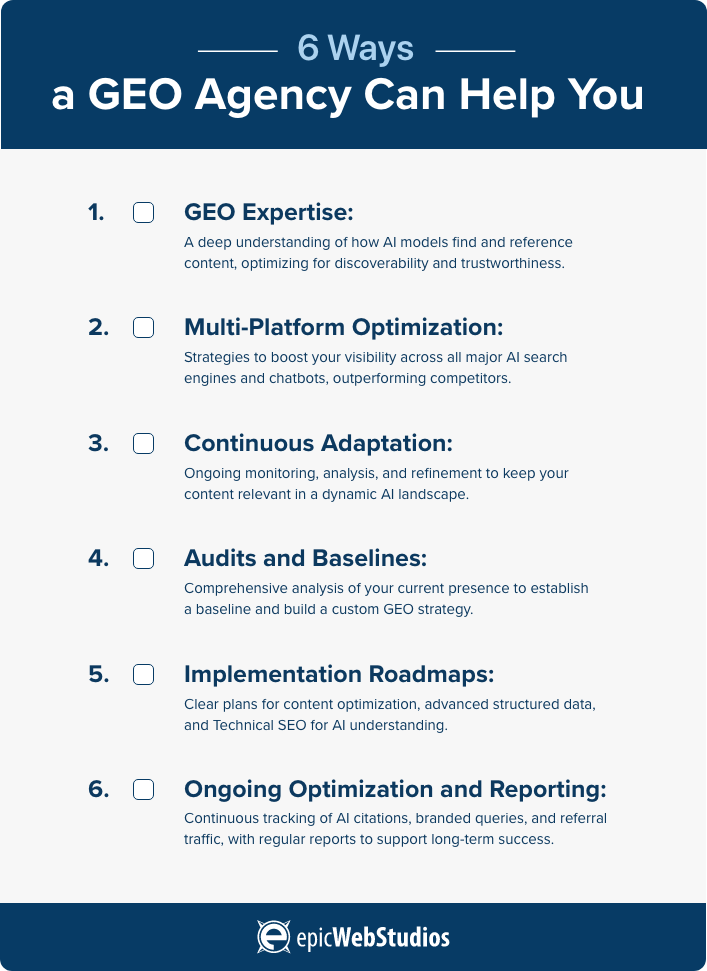
There's no sugar-coating it; GEO can be quite complex, and finding your way through this maze warrants specialized knowledge and continuous effort. If you're unsure how to do Generative Engine Optimization for your business, partnering with an experienced agency can make all the difference in staying ahead of the curve.
Here at Epic Web Studios, we deliver forward-thinking strategies, enabling your brand to stand out in AI-powered search through:
- GEO Expertise: A deep understanding of how AI models find and reference content, optimizing for discoverability and trustworthiness.
- Multi-Platform Optimization: Strategies to boost your visibility across all major AI search engines and chatbots, outperforming competitors.
- Continuous Adaptation: Ongoing monitoring, analysis, and refinement to keep your content relevant in a dynamic AI landscape.
- Audits and Baselines: Comprehensive analysis of your current presence to establish a baseline and build a custom GEO strategy.
- Implementation Roadmaps: Clear plans for content optimization, advanced structured data, and Technical SEO for AI understanding.
- Ongoing Optimization and Reporting: Continuous tracking of AI citations, branded queries, and referral traffic, with regular reports to support long-term success.
Master AI Search with Epic Web Studios
Every AI-generated response is a new opportunity to get noticed, so don't leave it to chance! Partner with Epic Web for a GEO strategy that positions your brand as the answer your audience is searching for.

